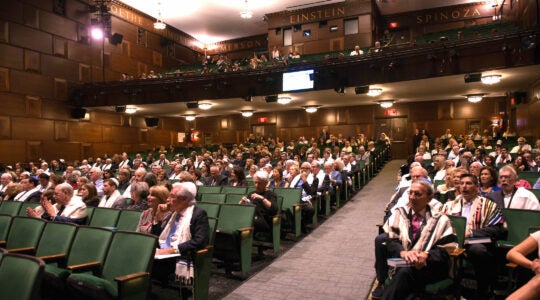Yetzi’at tzaddik min hamakom oseh roshem (the departure of a holy, righteous person leaves a real impact)—Rashi, Gen. 28:10.
Few people would have described Marcel Lindenbaum in his lifetime as a tzaddik. Marcel exuded joie de vivre, loved the finer things in life, possessed an adventurous spirit. He was a captain of his sailboat, horseback rider, opera lover, sharp dresser with bow tie and signature pocket handkerchief. He allowed himself one cigar a day until cancer warnings and children’s pressure made him stop. Bridge with Belda, Carol, and Mel was an occasional pastime.
Marcel had a mischievous twinkle in his sparkling blue eyes. He could be funnily irreverent, was not always PC, took delight in teasing and being teased back by his beloved grandchildren. His wry humor surfaced everywhere. When Abigail was away at college, he would send her the monthly credit card bill to approve with a note scribbled in the corner, “Loved you more before … ML.”
Yet the more I reflect on his life, the more apt is the description tzaddik. Marcel changed worlds with his beloved Belda. They were a team as Orthodox Judaism moved into the twentieth and twenty-first centuries; they worked symbiotically all of their adult lives to move the community to a new place—a more vibrant, ethical, committed, learned, nurturing place.
Along with his joie de vivre, Marcel was a deep and serious person, a profound thinker who understood matters at their very essence, often before others did. Among his “standard tzaddik qualities” was honesty to the core. He was straight as an arrow in dealing with people and organizations.
Family was central to his life, as was Jewish tradition and celebration. Having his married children live close by was all-important to him—and worth some engineering. When daughter Victoria became engaged to a young man established in Los Angeles, Marcel traveled the next day to convince him of the importance of raising a family in a strong Jewish community pulsing with Jewish life. “So why wait? Find a new job, move now, and how can I help?”
Marcel appreciated Jewish learning and listened to lectures and shiurim with keen interest. Honoring rabbis was his go-to position. Even when he disagreed or felt that the leadership diminished Modern Orthodox ethical values, even when he gave mussar, he showed respect and often love. He went further, putting financial support behind his recommendations.
His generosity was legion. Marcel supported Belda in all that she did, and she reciprocated, doubling the objects of their largesse. They did not wait to be asked, but sought out charitable enterprises they believed in, initiating support with no expectation of kavod in return.
Belda and Marcel took the same approach to helping individuals launch careers, receive education, or just find their way in a big world. They loved young people and gathered them around their gracious Shabbat table. Many a stray Jew in Manhattan and elsewhere turned into a communal servant under the arc of Belda and Marcel.
A leader who treated his followers as peers, Marcel called the shots as he saw them, but also understood the need for leaders to compromise, build allies, and nurture the future. And yet, just as a tzaddik’s vision of the world cannot be sidetracked, so Marcel, when convinced of the right path, might back off a bit in the face of opposition but never abandon principles or tire of trying. He would regroup and press forward again.
All of his life, Marcel carried with him the sensibility of “there but for the grace of God …” America was the prewar lifeline thrown to his family, and later, the goldene medina for an enterprising young man. Each year at Thanksgiving dinner, he presented what his family lovingly called his “refugee speech.” He never forgot his gratitude, even as he grew in allegiance and dedication to his beloved Israel—building homes, institutions, and communities there, as in New York. He taught his children and grandchildren well the values of a genuine dual loyalty.
Marcel Lindenbaum and JOFA
But why should remembrance of Marcel Lindenbaum be featured in the JOFA Journal? He was neither board member, nor sole benefactor on whom the organization depended, nor the only supportive husband or lone critic of the status quo.
He deserves a place in our public record, though, for he brought his exceptional human qualities to the work of JOFA. He also pioneered in the role of male feminist. In our early years, many of JOFA’s supportive men stood at the sidelines, in important but quiet support. Marcel was not afraid to publicly claim the title “feminist”—a term so many others, men and women alike, eschewed. He never missed a public event or conference.
Once he became convinced of the propriety of gender equality, he wore his mission on his sleeve, constantly. He measured everything against a standard of equal rights for women in Orthodoxy—women’s education, prayer, ritual, leadership, divorce law, and more.
Once he became convinced of the propriety of gender equality, he wore his mission on his sleeve, constantly. He measured everything against a standard of equal rights for women in Orthodoxy—women’s education, prayer, ritual, leadership, divorce law, and more.
He applied his wide range of talents to the work of JOFA—critical thinking, engaging the opposition, initiating ideas, cheering us on, and using power. “My father always used his power,” said Nathan, “encouraged my mother to use hers, and insisted that ‘women’s issues’ such as agunah would not be taken seriously until women generally used their powers.”
Perhaps most of all, in the words of his children, without Marcel Lindenbaum there would have been no Belda Lindenbaum extraordinaire. He pushed her to act on her dissatisfactions, to demand change, and in his support, she found strength.
Some examples: Marcel was as generous with praise as with critical insights. Many a time I would call to speak to Belda, and Marcel would answer the phone. “I hear you [JOFA] are thinking of .…” And then he would weigh in with pragmatics, approval, or a critique, reflecting on what may have been pillow talk the night before. I never knew whether he or Belda was the spark for a certain project because they walked in tandem.
We frequently used the Lindenbaum home for unofficial business, including conversations with foreign guests or others open to women’s issues. Instead of fleeing to a quiet spot in his home, Marcel relished participating in the conversations.
He held to his vision and had low tolerance for what he saw as backsliding. After a JOFA conference session, Marcel chastised me privately for reexamining an earlier view. “You should not have done that. You should not have walked back your original statement.” I was stunned—this from Marcel, my friend, my advocate. I hastily justified my remarks as being open-minded, respectful of those who opposed my views or felt I had gone too far. Marcel shot back: “How do you ever expect to achieve a change in others if you cave in to their ‘sensitivities?’ This [women’s equality within halakhah] is serious business. There’s no time to waste on niceties.” It was a sobering critique; when I rewrote the paper several years later, his words carried great weight.
Marcel and Belda were always looking out for JOFA—indeed, our first office, a posh address at Madison Avenue and 60th Street in Manhattan, was a generous gift from their sons Matthew and Bennett. They gave us a spacious room, secretarial cubicle, and shared equipment, space worth more than our total annual budget. Until then, two years since JOFA’s founding, our execs had worked out of a small cubicle graciously provided by Drisha, itself cramped for space. Having a real office was a turning point for JOFA; it gave our fledgling organization a new sense of pride and dignity. The lavish gift came directly from the sons, but the whisper of the father, who also worked out of his sons’ offices, surely helped.
Why a Tzaddik?
Still, why the term tzaddik? The answer is that Marcel understood all of his actions as a matter of justice, righting wrongs, and improving the world.
That also explains why he was so hands-on in his tzedakah, offering advice and criticism along with funding. When the International Beit Din was created several years ago, a Lindenbaum seat on the board was reserved in recognition of Marcel and Belda’s continuing efforts to end igun, a scourge that blights our community. Marcel believed that an initiative to resolve igun could also unite the entire community and enable it to move forward, unlike issues of women’s prayer or rabbinic leadership, which were red lines for Orthodoxy. We asked Marcel which of his children he wished to designate to fill that seat. All were active in Jewish community initiatives. Marcel, then 84, immediately responded, “I would like to fill the seat myself.”
Marcel saw every issue not as a small picture for equal rights but as a fundamental issue of justice and ethics. We have learned from the way he lived his life that tzaddikim in our times come in different forms and shapes. The true definition of a tzaddik is one who offers to other human beings a powerful and accessible model of righteousness, who leads us in perfecting the world with justice, and who teaches us that there are multiple ways in the course of a very human life to do God’s work on Earth. That, too, was Marcel’s “real impact.”
Blu Greenberg is JOFA’s founder and first president and remains an active member of its Board. She has authored several books and numerous articles.
Posts are contributed by third parties. The opinions and facts in them are presented solely by the authors and JOFA assumes no responsibility for them.
If you’re interested in writing for JOFA’s blog contact dani@jofa.org. For more about JOFA like us on Facebook or visit our website.
The New York Jewish Week brings you the stories behind the headlines, keeping you connected to Jewish life in New York. Help sustain the reporting you trust by donating today.




